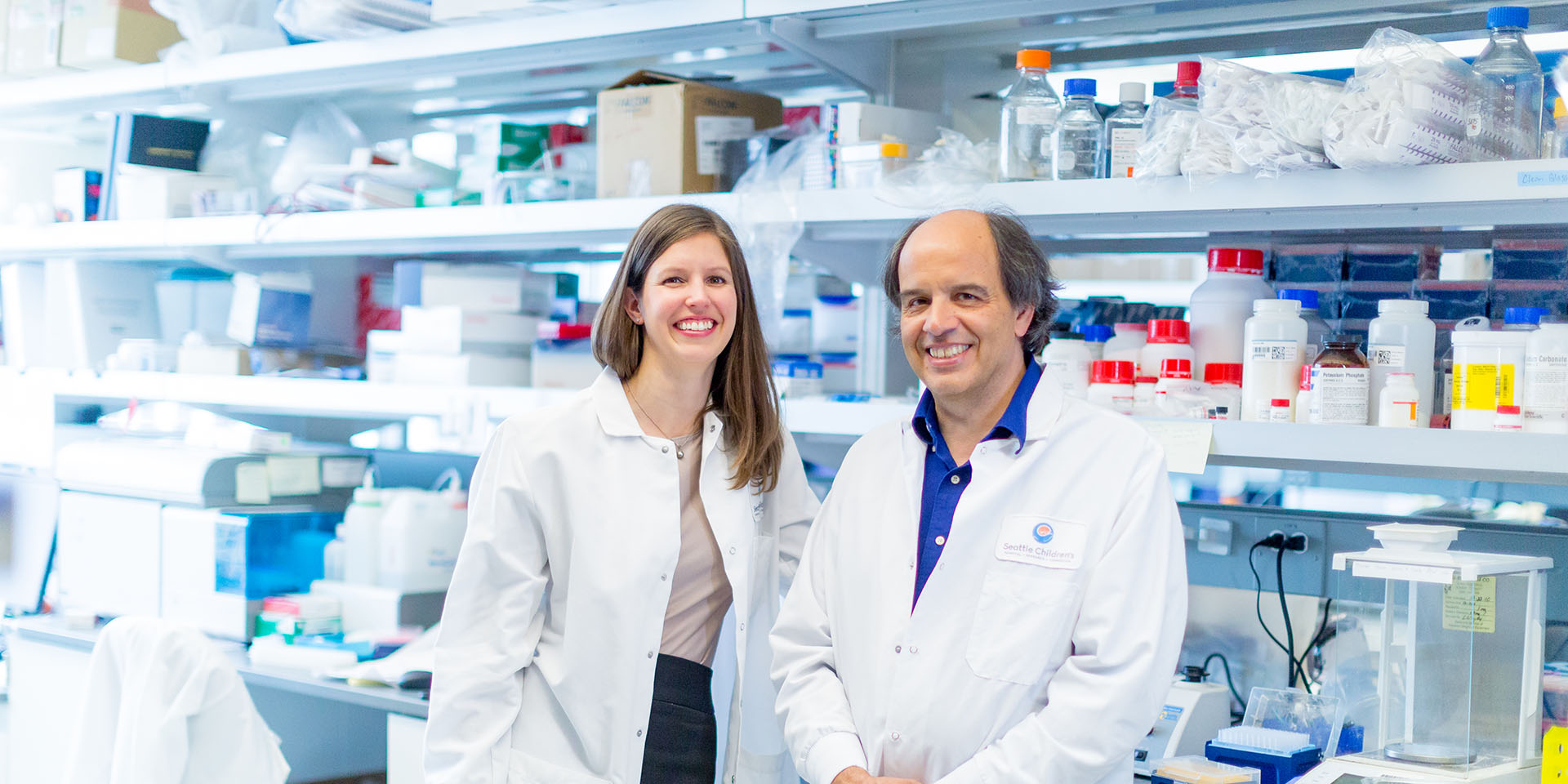
Ramirez Lab
The Ramirez Lab investigates brain functions in order to develop new ways to treat – and potentially cure – neurological disorders.
We are particularly interested in how neurons form into networks, and how those networks turn on and off to create rhythms that direct the brain – and the body – to perform different functions.
We take a collaborative approach to research, teaming up with experts in different disciplines – from genetics to biology to engineering – to study brain disorders and pursue cures.
Unraveling the mechanisms that control breathing
We discovered how the neuronal network that controls breathing reconfigures to generate sighs and gasps. Gasps in particular help animals and people take in air and survive when they’re starved of oxygen. Now we’re pinpointing the networks that control other aspects of breathing. This research is helping us understand sudden infant death syndrome (SIDS) and erratic breathing in children with Rett syndrome, epilepsy and other disorders.
Working to prevent SIDS and sudden deaths in general
The Ramirez lab has studied the causes leading to Sudden Infant Death Syndrome (SIDS) for more than two decades. Based on the concept that children die of SIDS because they fail to arouse in response to a hypoxic/hypercapnic stress, the Ramirez lab focused on unraveling the cellular mechanisms underlying the hypoxic response. This work led to many publications, and a deep understanding of the cellular and molecular mechanisms that reconfigure the respiratory network, and that activate an effective resuscitation response including characteristic changes in the heart rate and the activation of an arousal response.
In collaboration with their wonderful colleagues at Microsoft (AI for health) and Dr. Ed Mitchell (University of Auckland), the Ramirez lab has also explored the risk factors leading to SIDS. These epidemiological studies showed e.g. that children dying during the first 48 hours had different risk factors than those dying later suggesting that these deaths have different causes. Thus, the Ramirez lab now follows the hypothesis that the deaths occurring during the first 1-2 days after birth (SUEND, sudden unexpected neonatal death) are caused by the failure to transition from the uterus, where the baby is protected by the mother’s circulatory system, to air breathing, when the baby suddenly needs to rely on its own intact cardiorespiratory system. Multiple causes can be responsible for the failed transition including, disturbances in the development of lungs and heart as well as the central control of the cardiorespiratory network. Similarly, complex are the causes leading to SUID (sudden unexpected infant death), the deaths that occurs during the remainder of the first year. Aside of prone sleeping, smoking is another major and preventable risk factor for SUID, and every cigarette smoked during pregnancy increases the risk.
More recently the Ramirez lab began to pursue whole genome sequencing of tissue obtained from children that died of SIDS. They found that most potentially, pathogenic gene variants were associated with cardiac failure, sudden cardiac death and neurological disorders, in particular epilepsy. This finding was transformative as it suggests that many infants that died of SIDS had similar genetic vulnerabilities than children and adults dying later in life because of sudden cardiac death, sudden death of childhood (SUDC), sudden death of athletes or sudden death of epilepsy (SUDEP). The Ramirez lab continues whole genome sequencing of SIDS, but now expands their studies to also encompass SUDC, SUDEP and sudden cardiac death. The long-term goal is to develop postnatal sequencing to will early on diagnose children that are at risk to succumb to sudden death later in life. Given that more than 1000 people die of sudden death every day in the USA alone, the Ramirez lab believes that early diagnosis will lead to effective prevention strategies that will save many lives.
Studying how media use impacts brain development
We are teaming up with Dr. Dimitri Christakis and his lab to investigate how television and media impact brain development. Our initial research showed that too much media exposure can trigger attention problems in animal models.
Addressing attention and impulse control disorders
Tourette syndrome, attention deficit hyperactivity disorder (ADHD), obsessive-compulsive disorder and other conditions are united by a key thread: Affected children can’t control unwanted behaviors. We’re unraveling how the brain controls impulses and attention, and are studying promising therapies that correct these problems in animal models.
Understanding fatal seizures
We are collaborating with Dr. Franck Kalume and his lab to understand the causes of a fatal condition called sudden and unexpected death in epilepsy, and find ways to prevent it.
Targeting and understanding glioblastoma
The deep understanding of network function and the studies of neuroglial interactions motivated Dr. Ramirez to also study glioblastoma.
Halting schizophrenia progression
High levels of C4, a protein that is a key component of the body’s synaptic pruning pathway and helps to regulate connections between neurons, appear to be correlated with excessive synaptic pruning and the progression of schizophrenia. We have developed a Bispecific Complement Engaging Protein (BiCEP) that can bind to C4, remove it from circulation and mark it for degradation. We believe this novel therapeutic could be administered to patients who show early symptoms or higher risk of developing schizophrenia, to slow or halt the progression of the condition. We’re currently conducting proof-of-principle testing in preclinical models to generate preclinical data ahead of IND filing and future clinical trials.
Featured Research
Lab News
- August 31, 2025 Washington Research Foundation awards grant to Ramirez Lab to develop schizophrenia treatment
- April 9, 2025 Publication Q&A: Ndufs4 Inactivation in Glutamatergic Neurons Reveals Swallow-Breathing Discoordination in a Leigh Syndrome Model
- October 9, 2024 Ones to watch: young neuroscientists on the rise
See all news and publications.
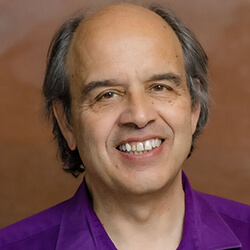
Nino Ramirez, PhD
Jan-Marino (Nino) Ramirez, PhD, is director of the Norcliffe Foundation Center for Integrative Brain Research at Seattle Children’s Research Institute and a professor of neurological surgery at the University of Washington. His work is supported by multiple National Institutes of Health grants.
-
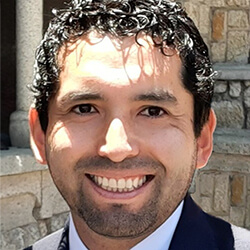
Christian Arias Reyes, PhD
Postdoctoral Researcher
Dr. Arias Reyes obtained his doctoral degree in cell and molecular biology at Laval University. His research focuses on studying the cellular and mitochondrial metabolic mechanisms of acclimatization to high-altitude hypoxia and their potential use in the treatment of mitochondrial diseases causing neurodegeneration like Leigh syndrome. He is skilled in bioenergetics, biochemical and molecular techniques for studying systemic and cellular responses to hypoxia. His overarching objective is to elucidate the cellular mechanisms underlying adaptation and acclimatization to high altitude in the brain. He maintains multiple collaborations with researchers in Latin America on topics related to high-altitude biology, including evolution, physiology and cell and molecular biology.
-

Michelle Bard
Clinical Research Coordinator
Michelle Bard holds a master of applied science degree in spatial analysis for public health from Johns Hopkins University. Since 2021, Michelle has been the clinical research coordinator for the Sudden Unexpected Infant Death (SUID) project at Seattle Children's Research Institute, which focuses on understanding the complex variables that converge to result in the tragic, sudden death of an infant. The project’s goal is to identify genetic risk factors for SUID by integrating whole genome sequencing, transcriptomics and multi-omics evidence in infants that have succumbed to SUID. She also manages various ongoing epidemiological studies aimed at detecting population-level risk factors for SUID. Additionally, she promotes global collaboration and data sharing with the intention of advancing the understanding of SUID and developing evidence-based interventions to save infant lives.
-

Hema Bhagavan, PhD
Postdoctoral Researcher
Dr. Bhagavan holds a doctorate in honeybee social behavior from the National Center for Biological Sciences, India, specializing in molecular neuroscience, social interactions and data analysis. She brings an interdisciplinary approach and uses cutting-edge techniques to understand brainstem neurons that regulate breathing. Her current research focuses on cell-type characterization using transcriptomics and electrophysiology. Previously, she worked with Dr. Olcese U. and Professor Pennartz's group at the Swammerdam Institute for Life Sciences, University of Amsterdam, where she developed skills working on mice. She is enthusiastic about specializing her research skills in the Ramirez Lab and expanding her knowledge in neuroscience.
-

Ryan Budde, PhD
Postdoctoral Researcher
Dr. Budde is a postdoctoral researcher in the Ramirez Lab in the Norcliffe Foundation Center for Integrative Brain Research at Seattle Children's Research Institute. He obtained his PhD in biomedical engineering at the Johns Hopkins School of Medicine in 2024, studying under Professor Pedro Irazoqui. Budde’s work has focused on implantable device design, neuromodulation and epilepsy. His current work explores the mechanisms of apnea in the brainstem, linked to fatal apneas in sudden unexpected death in epilepsy (SUDEP), sudden infant death syndrome (SIDS), sudden unexpected death in childhood (SUDC) and related cases. He also explores epileptogenesis more broadly and other respiratory coordination issues (dysphagia, croup, aspiration pneumonia) common across many disorders.
-
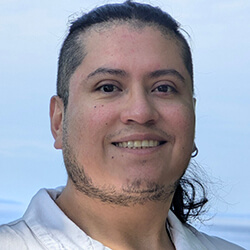
Ricardo Erazo-Toscano, PhD
Postdoctoral Researcher
Dr. Erazo, a junior postdoctoral fellow in the Ramirez Lab, blends Ecuadorian roots with U.S. scientific rigor. His research on SIDS epidemiology explores parental behavior and demographics. With a PhD in neuroscience from Georgia State University, he excels in computational neuroscience, using data science to analyze complex datasets and uncover insights into respiratory rhythms.
-

Luiz Oliveira, PhD
Postdoctoral Researcher
Dr. Oliveira earned his PhD in pharmacology from the University of São Paulo in 2019 and started his postdoctoral training in 2021. He focuses on investigating the role of various groups of neurons in both breathing and chemoreception in Parkinson's disease. Since joining the Ramirez Lab, he has focused on studying the circuitry involved in post-inspiratory activity. More recently, he has shifted his focus to investigating the role of astrocytes located at the ventral respiratory column in the arousal response.
-
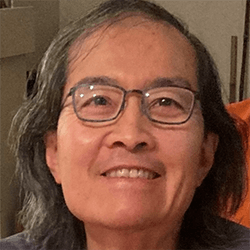
Research Scientist III
Dr. Wei hails from Taiwan and grew up in Wisconsin and East Tennessee. He graduated from the University of California, Berkeley, with an AB (neurobiology), and the University of Oregon with a PhD in biology (neuroethology) with Graham Hoyle. He received postdoctoral training in molecular neurobiology at Washington University School of Medicine with Lawrence Salkoff, where he developed his fascination with ion channels, particularly the genetic diversity of potassium channels. He moved to Seattle Children's Research Institute and helped start NFCIBR as one of its founding cohorts of researchers. Dr. Wei has had the immense pleasure of serving on the research faculties at Washington University and the University of Washington.
